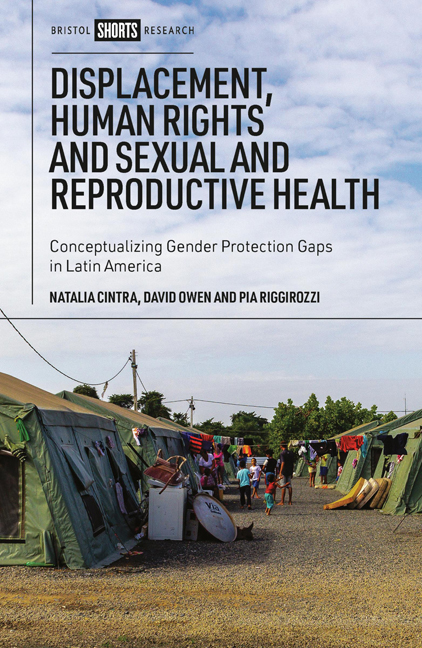 Displacement, Human Rights and Sexual and Reproductive Health
Displacement, Human Rights and Sexual and Reproductive Health Book contents
- Frontmatter
- Dedication
- Contents
- List of Figures and Tables
- Acknowledgements
- Introduction
- One The Gendered Character of Forced Migration
- Two Problematizing the Migrant– Refugee Distinction in Latin America
- Three Latin American Normative Frameworks of Migration and Asylum
- Four Protecting the Human Right to Health of Women and Girls from Venezuela as Necessary Fleers
- Five Responsibility and the Ethics of Forced Displacement in South America
- Conclusion
- Notes
- References
- Index
Two - Problematizing the Migrant– Refugee Distinction in Latin America
Published online by Cambridge University Press: 18 January 2024
- Frontmatter
- Dedication
- Contents
- List of Figures and Tables
- Acknowledgements
- Introduction
- One The Gendered Character of Forced Migration
- Two Problematizing the Migrant– Refugee Distinction in Latin America
- Three Latin American Normative Frameworks of Migration and Asylum
- Four Protecting the Human Right to Health of Women and Girls from Venezuela as Necessary Fleers
- Five Responsibility and the Ethics of Forced Displacement in South America
- Conclusion
- Notes
- References
- Index
Summary
The general concept ‘migrant’ encompasses a heterogeneous range of individuals who move from one place to another for different reasons. Migrants may move within or across state borders. Migration may involve pendular, circular, or return movements; transit, settlement, or just travel for short periods of time. What forms a specific migration may change depending on the situation, the dynamics of movement, and on the migrants’ opportunities to exercise choice, desire, and agency. As a legal concept and in policy contexts, however, ‘migrant’ is distinguished from, on the one hand, ‘visitors’ (such as tourists) and, on the other hand, ‘refugees’ (and related categories). Our focus in this chapter is on the distinction between ‘migrants’ and ‘refugees’, and the implications of the ways this distinction is mobilized in, and plays out across, legal, political and social contexts with significant effects on the rights and wellbeing of those subject to this schema. As noted in the last chapter, this is particularly important in the case of displaced Venezuelans, especially Venezuelan women and girls. The primary reasons for their displacement are extreme poverty, lack of medical services, gender-based violence, and lack of sustenance and hence they are not straightforwardly encompassed by categories of international refugee protection and, therefore, may fail to be recognized as entitled to the necessary protection and assistance, becoming vulnerable to yet more rights violations, even in their already very fragile circumstances.
We begin by considering debates around the category of ‘refugee’ and the political role of such debates within the current international refugee regime, before turning to the way in which the refugee/migrant distinction establishes a rights hierarchy in the reception and treatment of bordercrossing people. Against this backdrop, we argue for a framework in which the categories of displaced persons to whom international assistance and protection need to be provided is specified by the concept of ‘necessary fleers’ (Aleinikoff and Zamore 2019) which denotes all those for whom conditions in their home state make flight across a border a reasonable and justifiable recourse for securing basic human rights. These are people who may reasonably conclude that they have no alternative other than to leave the country and enter a migration process because of a direct threat or the prospects of physical insecurity or the loss of shelter and livelihood, or because their ability to care for themselves and their families are radically undermined.
- Type
- Chapter
- Information
- Displacement, Human Rights and Sexual and Reproductive HealthConceptualizing Gender Protection Gaps in Latin America, pp. 45 - 63Publisher: Bristol University PressPrint publication year: 2023
